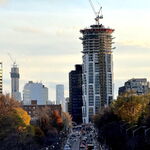A
AlvinofDiaspar
Guest
From the Star, by Hume:
Where is Toronto at forum on cities?
Absence is `appalling,'
says David Crombie
Jun. 20, 2006. 01:00 AM
CHRISTOPHER HUME
VANCOUVER—The world has come here to talk about cities, but Toronto is nowhere to be seen.
More than 5,000 delegates from 160 countries have gathered in Vancouver for the third United Nations World Urban Forum. Vancouver is represented, as are Victoria and Montreal, and cities from as far away as Tanzania and Afghanistan. So where is Toronto? As far as visitors here are concerned, it might as well not exist.
"It's worse than appalling," says former Toronto mayor David Crombie, in a rare display of anger. "Toronto is self-absorbed. It doesn't think it has to try. The issue is not the mayor (David Miller), but there is no sense that we're a part of the rest of the planet."
Crombie is chair of the Canadian Urban Institute, which has a booth at the Vancouver Convention Centre, along with a number of cities and countries from around the globe. He is one of a handful of prominent Torontonians who have made the trip to the west coast to join in the discussion.
Even Prime Minister Stephen Harper showed up yesterday at the opening ceremony to extol the virtues of his government and underline his dedication to the urban agenda. Though his tone was defensive, he spoke about his commitment to everything from the environment to fighting crime. But even Harper had to admit that Canada's cities remain "a work in progress."
No one here would disagree with that, but compared to the situation in other parts of the world, our problems don't seem so grave. Indeed, the backdrop to the forum is the unprecedented, even terrifying, speed of global urbanization. According to UN figures, some time this year or next, more than half of the world's population will inhabit cities rather than rural areas. To make matters worse, many of these new urban dwellers are desperately poor.
Eduardo Moreno, of the UN-Habitat Human Settlements Program, told reporters that one billion people now live in slums and he said that number is expected to double within a decade. The greatest rates of urbanization are not in the West or the rich North, but in the developing world, especially sub-Saharan Africa, which if current trends continue, will be the location of some of the most populous cities on earth by 2020. Lagos alone could have more than 20 million inhabitants.
The phrase of the day, heard here over and over again, is "the urbanization of poverty."
As one conference official put it, "The developing world is going through its 19th century now."
Anna Tibaijuka, the executive director of UN-Habitat, called the situation "an affront to human dignity." She described slums so bad that 300 residents are forced to share a single toilet.
Slum dwellers, she said, die younger, and are more likely to be victims of crime.
"Poverty," she noted bitterly, "is the biggest polluter."
But as delegates wandered through the convention centre, eating, drinking, chatting and admiring the view of snow-capped mountains on the far side of Vancouver's harbour, the forum took on an almost festive air. Musicians, dancers and acrobats on stilts entertained the crowds while the warm west coast sun brought smiles to their faces.
This conference is intended to bring together people from different corners of the planet to share ideas, experiences and best practices. No policy directives will be released, no statements issued; this forum is dedicated to roundtables, networking sessions and lots of talk. Mayors of cities such as Kabul, Nairobi and Nanjing are participating, along with a gaggle of government ministers. They are here, they say, to listen and learn. Which brings us back to Toronto, where, says former chief planner and delegate Paul Bedford, we live in a "culture of poverty." He's right, but then everything is relative. But by the standards of much of the world, Bedford notes, Toronto is rich beyond people's wildest expectations.
In any case, the only city councillor on hand for the World Urban Forum is Pam McConnell, here as a member of UNICEF. There are a couple of senior city bureaucrats here as delegates as well, as are several members of the Toronto Youth Cabinet.
Miller is booked to attend a meeting of mayors from cities around the Great Lakes in Parry Sound later this week, a spokesperson told the Star's John Spears.
Premier Dalton McGuinty says he wasn't invited, though the provincial Ministry of Municipal Affairs and Housing does have a booth.
The forum continues until Friday.
_________________________________________________
As regrettable as it is, the said paper never said a word about the Metropolis conference held in Toronto last week.
AoD
Where is Toronto at forum on cities?
Absence is `appalling,'
says David Crombie
Jun. 20, 2006. 01:00 AM
CHRISTOPHER HUME
VANCOUVER—The world has come here to talk about cities, but Toronto is nowhere to be seen.
More than 5,000 delegates from 160 countries have gathered in Vancouver for the third United Nations World Urban Forum. Vancouver is represented, as are Victoria and Montreal, and cities from as far away as Tanzania and Afghanistan. So where is Toronto? As far as visitors here are concerned, it might as well not exist.
"It's worse than appalling," says former Toronto mayor David Crombie, in a rare display of anger. "Toronto is self-absorbed. It doesn't think it has to try. The issue is not the mayor (David Miller), but there is no sense that we're a part of the rest of the planet."
Crombie is chair of the Canadian Urban Institute, which has a booth at the Vancouver Convention Centre, along with a number of cities and countries from around the globe. He is one of a handful of prominent Torontonians who have made the trip to the west coast to join in the discussion.
Even Prime Minister Stephen Harper showed up yesterday at the opening ceremony to extol the virtues of his government and underline his dedication to the urban agenda. Though his tone was defensive, he spoke about his commitment to everything from the environment to fighting crime. But even Harper had to admit that Canada's cities remain "a work in progress."
No one here would disagree with that, but compared to the situation in other parts of the world, our problems don't seem so grave. Indeed, the backdrop to the forum is the unprecedented, even terrifying, speed of global urbanization. According to UN figures, some time this year or next, more than half of the world's population will inhabit cities rather than rural areas. To make matters worse, many of these new urban dwellers are desperately poor.
Eduardo Moreno, of the UN-Habitat Human Settlements Program, told reporters that one billion people now live in slums and he said that number is expected to double within a decade. The greatest rates of urbanization are not in the West or the rich North, but in the developing world, especially sub-Saharan Africa, which if current trends continue, will be the location of some of the most populous cities on earth by 2020. Lagos alone could have more than 20 million inhabitants.
The phrase of the day, heard here over and over again, is "the urbanization of poverty."
As one conference official put it, "The developing world is going through its 19th century now."
Anna Tibaijuka, the executive director of UN-Habitat, called the situation "an affront to human dignity." She described slums so bad that 300 residents are forced to share a single toilet.
Slum dwellers, she said, die younger, and are more likely to be victims of crime.
"Poverty," she noted bitterly, "is the biggest polluter."
But as delegates wandered through the convention centre, eating, drinking, chatting and admiring the view of snow-capped mountains on the far side of Vancouver's harbour, the forum took on an almost festive air. Musicians, dancers and acrobats on stilts entertained the crowds while the warm west coast sun brought smiles to their faces.
This conference is intended to bring together people from different corners of the planet to share ideas, experiences and best practices. No policy directives will be released, no statements issued; this forum is dedicated to roundtables, networking sessions and lots of talk. Mayors of cities such as Kabul, Nairobi and Nanjing are participating, along with a gaggle of government ministers. They are here, they say, to listen and learn. Which brings us back to Toronto, where, says former chief planner and delegate Paul Bedford, we live in a "culture of poverty." He's right, but then everything is relative. But by the standards of much of the world, Bedford notes, Toronto is rich beyond people's wildest expectations.
In any case, the only city councillor on hand for the World Urban Forum is Pam McConnell, here as a member of UNICEF. There are a couple of senior city bureaucrats here as delegates as well, as are several members of the Toronto Youth Cabinet.
Miller is booked to attend a meeting of mayors from cities around the Great Lakes in Parry Sound later this week, a spokesperson told the Star's John Spears.
Premier Dalton McGuinty says he wasn't invited, though the provincial Ministry of Municipal Affairs and Housing does have a booth.
The forum continues until Friday.
_________________________________________________
As regrettable as it is, the said paper never said a word about the Metropolis conference held in Toronto last week.
AoD




